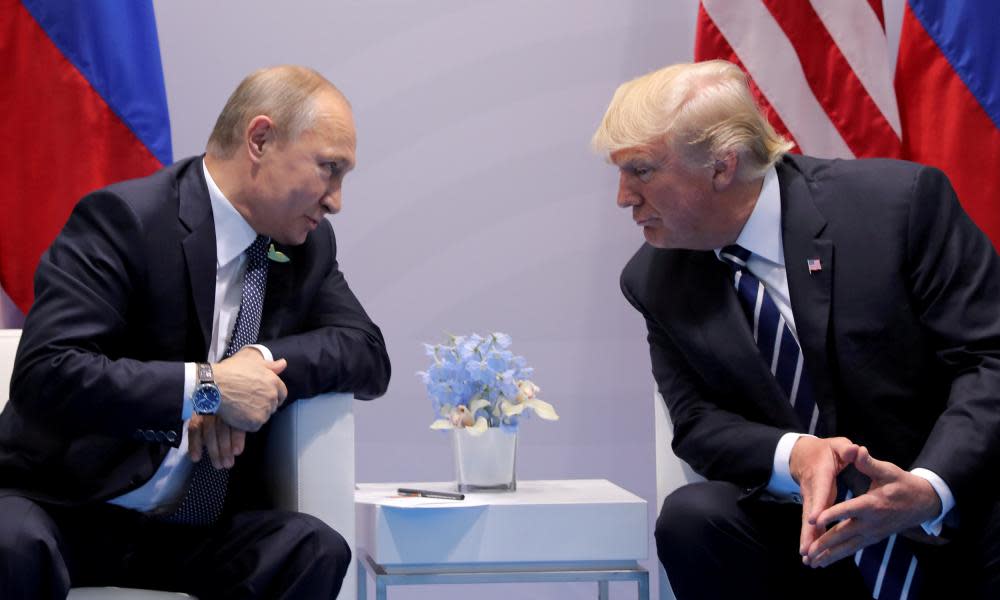The Guardian view on the Trump-Putin meeting: good for Vladimir, but not for the rest of us

Donald Trump and Vladimir Putin meet one-to-one in Helsinki on Monday, accompanied only by their interpreters – we think; at a previous private discussion, only the Russian leader’s aide was present. The two presidents’ histories and personalities tell us that this meeting is likely to be bad for America, and worse for its allies. If the US president’s solo encounter with Kim Jong-un is anything to go on, Mr Trump may not be certain what he is saying yes or no to; may not remember it; and may well make ill-judged concessions for little if any return.
We can also be sure that it is likely to be good for Mr Putin. He is already on a winning streak. Perhaps the only thing more satisfying than the World Cup’s success has been Mr Trump’s tour of Europe: undermining Nato, rattling governments and humiliating the leader of a close ally which is still dealing with the aftermath of a fatal nerve agent attack blamed on the Russian state. Mr Putin’s stature is boosted by the very fact of a private discussion with the US president. Mr Trump calls the European Union a foe, while if Russia is a foe “in certain regards”, its president is still “not my enemy”.
Russia has legitimate interests and legitimate concerns about western policy; it also has a record of pursuing its interests by illegitimate and destructive means. On both counts, top-level diplomacy could have an impact. The issue that should surely dominate, not least given Friday’s announcement of criminal charges against 12 Russian agents for hacking and leaking the emails of senior Democrats, is unlikely to do so: the US president has repeatedly dismissed Robert Mueller’s investigation into Russian interference in the 2016 presidential election and possible collusion with members of his campaign team as a “rigged witch-hunt”. Even if Mr Trump thinks it tactical to take a public swipe at his counterpart, he is unlikely to do so on these grounds. That counts as a win for Russia. Novichok? That might get a passing mention.
Mr Putin brings experience, preparation, ruthless discipline and actual goals: he is the poker ace facing a man who has mastered only beggar-my-neighbour. So any substantive discussions between the men may be more worrying than the omissions. (Only Mr Trump could make the prospect of “surprising” outcomes in Helsinki sound quite so ominous.) Their shared hostility to Nato, the EU and established US alliances is alarming. And we do not know why Mr Trump wants this meeting, beyond enjoying the spotlight.
The run-up has seen much talk (largely promoted by Israel and Gulf states) of some form of Syria deal: perhaps a “grand bargain”, with Russia pushing Iran out in exchange for the US recognising Russia’s annexation of Crimea and lifting sanctions. This is not in either man’s gift. A narrower deal – with Russia promising to ensure Iranian-backed forces stay away from the border with Israel, in exchange for the US withdrawing from positions in eastern Syria and accepting Bashar al-Assad’s continued rule – might be somewhat more plausible. But Mr Trump’s leverage is limited; Mr Putin knows he is already minded to withdraw forces. And the price would still be too high.
Diplomacy over Ukraine is in stalemate, but re-engagement is not the same as unilateral action, still less simply handing Mr Putin whatever he requests. Mr Trump cannot lift the sanctions; but he could well offer some form of words that makes Russia’s case for it – and, in the longer run, helps to shift the political mood, as Republican views on Russia have already shifted.
It is true that the Trump administration has been markedly tougher on Russia than the president himself, reportedly to his fury. Michael McFaul, the former US ambassador to Moscow, suggests that the primary danger is that Mr Trump “agrees out of ignorance or misinformation to something and they need to walk it back” in the wider subsequent meeting – but acknowledges the scarier, if less likely, possibility that he will really make policy. This week suggests that Europe – including the UK – may at last be truly grasping that it cannot count on the rest of the US government, Republican grandees, Mr Mueller or even US voters to ride to the rescue. Some serious planning for a very different future may be a good idea. But no one could call it good news.

 Yahoo News
Yahoo News 
